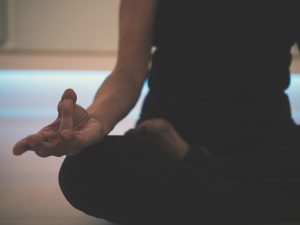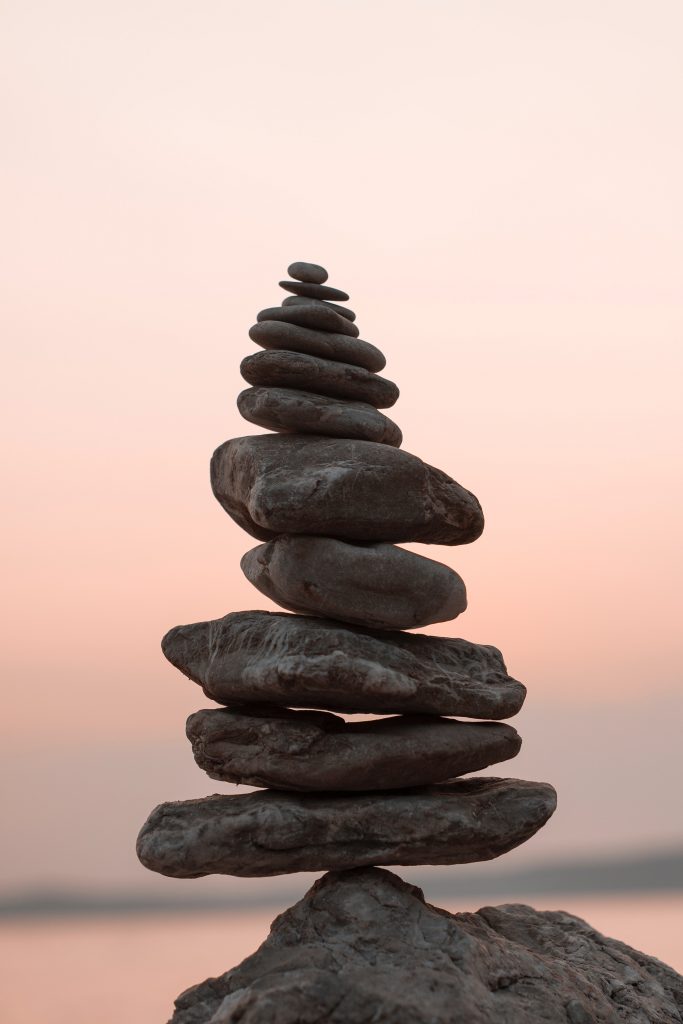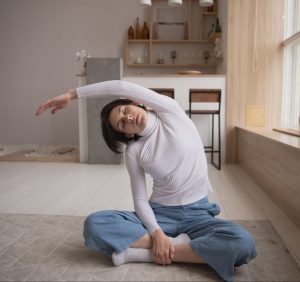Wellness Resources During COVID-19
If you’re feeling stressed or nervous during these days of COVID-19, you’re not alone. What you’re feeling is common around the world. Living with cancer is difficult, and the COVID-19 pandemic is an added stress for our patients, their caregivers, and our community. We recognize the importance to for you to take care of yourself.

We have two videos sharing how UNC Cancer Care is keeping patients safe during the COVID-19 crisis and how the Comprehensive Cancer Support Program (CCSP) has made specific adaptations for you during this time.
We also want to share some resources to help you stay healthy both physically and mentally. In addition, don’t forget to explore the adapted other ongoing services of the CCSP.
Some of these tools to reduce stress you can do right now, and others can take time to learn. Listed in this section are tools that can help you find relaxation and reduce stress right now. Just like there is no one “tool” for every carpentry need, there is no one tool for every individual. You will find one that works. Try them out and see which one works for you. Healthy eating and activity will also help.
Quick links to sections on this page
- Helpful Quick Reads
- Relaxation Exercises
- Guided Meditation/Imagery, and Mindfulness
- CCSP Remote Exercise Instruction (Get REAL & HEEL, and Yoga)
- Suggested Apps
- COVID-19 Wellness Resources in Spanish
Do you need help or know someone who does?
Our group of psychiatrists, psychologists, and counselors are also available for telehealth appointments at this time and are working on online support groups.
If you, or someone you care about, are feeling overwhelmed with emotions like sadness, depression, or anxiety, or feel like you want to harm yourself or others, please reach out for help:
- If you are in an emergency situation, call 911.
- For anyone affected by abuse or needing support, visit the National Domestic Violence Hotline or call 800-799-SAFE(7233) (TTY: 800-787-3224) or send the text LOVEIS to an advocate at 22522.
Helpful Quick Reads
Self Care
- Acknowledging the loss we feel (NPR)
- Moral fatigue during the COVID-19 pandemic (Rolling Stone)
- Strategies to promote better sleep in these uncertain times (Harvard Health Publishing)
- 4 Self-Care Tips for How to Deal with Anxiety (National Council for Behavioral Health)
- Nutrition tips during COVID-19 (PDF) (UNC-Chapel Hill Gillings School of Global Public Health, Department of Nutrition)
Caring For Others
- Talking to Children about COVID-19 (National Association of School Psychologists)
- How to Support a Loved One Going Through a Tough Time During COVID-19 (National Council for Behavioral Health)
Working From Home
- How to find your focus will working from home tip sheet (Virgin Pulse)
Relaxation Exercises
Many people wait until they are in a lot of pain or feel a lot of stress before they try to relax, when it can be hardest to succeed. Then they might try to relax by overeating, smoking, or drinking—activities that are not helpful and might even be harmful.
Take the time to learn helpful relaxation skills and practice them often. You can also take a class, buy a relaxation CD, or find exercises on the Internet.
 Body Scan Exercise – Jon Kabat-Zinn
Body Scan Exercise – Jon Kabat-Zinn
Jon Kabat-Zinn is Professor of Medicine Emeritus and creator of the Stress Reduction Clinic and the Center for Mindfulness in Medicine, Health Care, and Society at the University of Massachusetts Medical School.
Learning to Relax Adjusting to Life Change (from NCI Facing Forward)
Many people with cancer have found that practicing deep relaxation has helped relieve their pain or reduce their stress. The following exercises may not be right for everyone.
Ask your doctor or nurse if these exercises can help you. Before trying the full exercise below, first practice steps 1 through 5, so you can get used to deep breathing and muscle relaxation. You may find that your mind wanders. When you notice yourself thinking of something else, gently direct your attention back to your deepening relaxation. Be sure to maintain your deep breathing. If any of these steps makes you feel uncomfortable, feel free to leave it out.
- Sit comfortably. Loosen any tight clothes. Close your eyes. Clear your mind and relax your muscles by breathing deeply at a slow and relaxing pace. People usually breathe shallowly, high in their chests. Concentrate on breathing deeply and slowly, raising your belly, rather than just your chest, with each breath.
- Next, go through each of your major muscle groups, tensing (squeezing) them for 10 seconds and then relaxing. If tensing any particular muscle group is painful, skip the tensing step and concentrate just on relaxing. Focus completely on releasing all the tension from your muscles and notice the differences you feel when they are relaxed. Focus on the pleasant feeling of relaxation.
- Focus your mind on your right arm. Repeat to yourself, “My right arm feels heavy and warm.” Stick with it until your arm does feel heavy and warm.
- Repeat with the rest of your muscles until you are fully relaxed.
Part 1
- Find a quiet place where you can rest undisturbed for 20 minutes. Let others know you need this time for yourself.
- Make sure the setting is relaxing. For example, dim the lights if you like, and find a comfortable chair or couch.
- Get into a comfortable position where you can relax your muscles. Close your eyes and clear your mind of distractions.
- Breathe deeply, at a slow and relaxing pace. People usually breathe shallowly, high in their chests. Concentrate on breathing deeply and slowly, raising your belly, rather than just your chest, with each breath.
- Next, go through each of your major muscle groups, tensing (squeezing) them for
10 seconds and then relaxing. If tensing any particular muscle group is painful, skip the tensing step and concentrate just on relaxing. Focus completely on releasing all the tension from your muscles and notice the differences you feel when they are relaxed. Focus on the pleasant feeling of relaxation.
In turn, tense, hold, and relax your:
-
- Right and left arms. Make a fist and bring it up to your shoulder, tightening your arm.
- Lips, eyes, and forehead. Scowl, raise your eyebrows, pucker your lips, and then grin.
- Jaws and neck. Thrust your lower jaw out, and then relax. Then tilt your chin down toward your chest.
- Shoulders. Shrug your shoulders upward toward your ears.
- Chest. Push out your chest.
- Stomach. Suck in your stomach.
- Lower back. Stretch your lower back so that it forms a gentle arch, with your stomach pushed outward. Make sure to do this gently, as these muscles are often tight.
- Buttocks. Squeeze your buttocks together.
- Thighs. Press your thighs together.
- Calves. Point your toes up, toward your knees.
- Feet. Point your toes down, like a ballet dancer’s.
Part 2
- Review these parts of your body again and release any tension that remains. Be sure to maintain your deep breathing.
- Now that you are relaxed, imagine a calming scene. Choose a spot that is particularly pleasant to you. It may be a favorite comfortable room, a sandy beach, a chair in front of a fireplace, or any other relaxing place. Concentrate on the details:
- What can you see around you?
- What do you smell?
- What are the sounds that you hear? For example, if you are on the beach, how does the sand feel on your feet, how do the waves sound, and how does the air smell?
- Can you taste anything?
- Continue to breathe deeply as you imagine yourself relaxing in your safe, comfortable place.
- Some people find it helpful at this point to focus on thoughts that enhance their relaxation. For example: “My arms and legs are very comfortable. I can just sink into this chair and focus only on the relaxation.”
- Spend a few more minutes enjoying the feeling of comfort and relaxation.
- When you are ready, start gently moving your hands and feet and bringing yourself back to reality. Open your eyes and spend a few minutes becoming more alert. Notice how you feel now that you have completed the relaxation exercise, and try to carry these feelings with you into the rest of your day
Guided Meditation/Imagery

Guided imagery (sometimes called guided meditation, visualization, mental rehearsal, and guided self-hypnosis) is a gentle but powerful technique that focuses the imagination in proactive, positive ways. It can be especially helpful in high stress times when it’s too hard to meditate on your own. Guided Imagery is a form of meditation and can be used interchangeably with the term Guided Meditation.
Facing Pandemic Fears with an Awake Heart with Tara Brach (pre-recorded 61 minutes)
Tara Brach is a well-known teacher, author, and therapist.
Coronavirus: How to Dispel Fear and Resist Viral Infection
Emmett Miller, MD, a graduate of the Albert Einstein College of Medicine gained international prominence as a founder and Medical Director of the Cancer Support and Education Center (now the Center for Healing and Wellness).
Mindfulness
Mindfulness and meditation teaches you how to relax, focus, and reduce stress.
Mindful Moments is a 1:1 stress reduction program through the CCSP. You will meet via phone or video with a yoga therapist who will lead you through meditation, guided imagery, and guided relaxation to help with stress and anxiety reduction. This program is free of charge. To schedule, contact Carly Bailey at carly_bailey@med.unc.edu
Additional mindfulness resources
- One-Minute Mindfulness Meditation: Taking Care of You During COVID-19
- Mindfulness Exercises
- 2,000+ free mindfulness exercises, including courses, audio, worksheets, quotes and more.
- Learn methods to ease your stress
- How to slow down, stay calm, focused and relaxed
- Improve your ability to meet life’s challenges
Remote Exercise Instruction
The CCSP Exercise program is now offering remote exercise instruction for patients and survivors enrolled in an exercise program.
Get REAL & HEEL
Get REAL & HEEL is a free in-person exercise and wellness program for cancer survivors of all types. Patients and survivors enrolled in Get REAL & HEEL and yoga can continue their workouts from home. Please contact Carly Bailey at carly_bailey@med.unc.edu to gain access. Sessions are held over Zoom video.
 Yoga
Yoga
CCSP Remote Yoga Instruction
Patients and survivors enrolled in yoga can continue their workouts from home. Please contact Carly Bailey at carly_bailey@med.unc.edu to gain access. Sessions are held over Zoom video.
Disclaimer: Please check with your health care providers before starting any new exercise.
Remote Yoga Schedule
- Monday 10 – 11:30 a.m.
- Tuesday 10 – 11:30 a.m.
- Wednesday 2 – 3:30 p.m.
- Thursday 10 – 11:30 a.m.
- Friday 10 – 11:30 a.m.
Yoga Resources
- 3 Yoga Poses That Help You Relax
- Free yoga on YouTube
- Yoga with Adriene: 5-45 minute multi-level variety classes that focus on relieving anxiety and healing through practice.
- Yoga with Kassandra: Quick 5-30 minute classes that focus on stretching, flow, improved sleep and more.
Suggested Apps
Calm and Headspace
Both are popular free apps for relaxation, meditation, and sleep. Free versions are available.
Healthy Minds Program
Free app assesses your well-being needs and provides brief trainings and practice to improve user’s foundations, awareness, connection, insight and purpose.
Breathe
App that provides free 10 minute of less guided meditation sessions based on your reported emotions. (Additional sessions available to Premium Members for $9.99/mo., $58.99/yr.)
Relax Melodies
Features many free sounds and programs that help with calming the mind and aid restful sleep. Users can create their own white noise, participate in a 15-20 minute meditation or complete a program to help pause and de-stress. (Unlimited access to all features for $59.99/yr.)
This resource list is meant to be used as a guide and is not comprehensive. The information provided was the most current information available at the time of the publication. Some material may change or become dated. The sponsors and individuals listed assume no responsibility for time sensitive information. It is the responsibility of the individual user to verify the accuracy of pertinent content. Material provided does not constitute an endorsement or specific recommendation by UNC Cancer Care, UNC Lineberger Comprehensive Cancer Center, or any of it’s affiliations.
